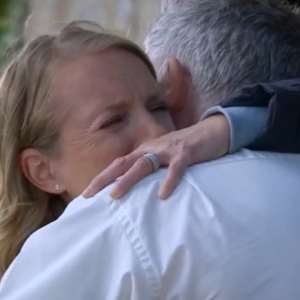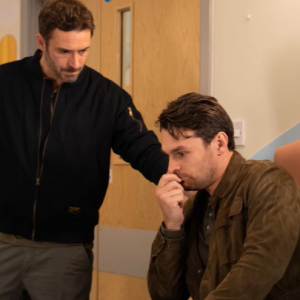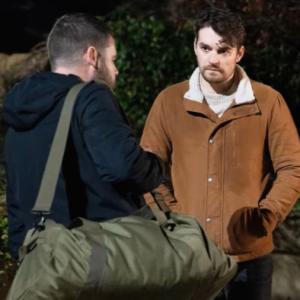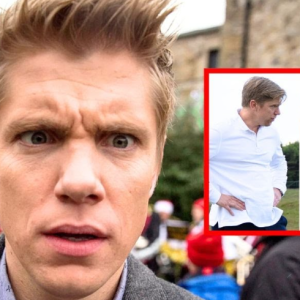The rolling hills of the Yorkshire Dales, usually a backdrop for quiet village life, now bear the indelible stain of a tragedy that has left Emmerdale irrevocably altered. A chilling wind has swept through the heart of the community, extinguishing two of its most formidable flames: Moira Dingle and Celia Daniels. Their intense, escalating conflict, once a slow-burn thriller gripping audiences, has culminated in a devastating outcome, leaving fans to mourn the loss and ponder the fateful choices that led to such an unimaginable end. The village, and indeed the entire Emmerdale universe, is now forced to confront a void left by the absence of two women whose intertwined destinies spiraled into a final, heartbreaking collision.
For years, Moira Dingle stood as a beacon of resilience, a matriarch who had navigated more storms than the Dales themselves. From the agonizing loss of her beloved husband, John, to countless betrayals, financial ruin, and fierce family feuds, Moira had always emerged, scarred but unbowed. Butler’s Farm was more than just land and buildings; it was the very essence of her identity, a living testament to her hard work, her family’s legacy, and the blood, sweat, and tears she poured into its soil. Her fierce spirit, her unwavering grit, made her seem unsinkable, an immovable force against any tempest. Yet, in the end, even the fiercest matriarch proved vulnerable, and her story, once a testament to survival, concluded in a poignant, tragic silence.
The harbinger of this eventual devastation arrived not with a thunderclap, but with the quiet, unsettling presence of Celia Daniels. Played with brilliant, steely poise by the iconic Jay Griffiths – a familiar face from the intense worlds of Casualty and The Bill – Celia was no ordinary village antagonist. She exuded a polished, almost unnerving sophistication, her calculating demeanor masked by an outward calm that belied a formidable intellect and an almost predatory ambition. When Celia first appeared, offering to rent Butler’s Farm, it was immediately clear to seasoned viewers that this was the genesis of an inevitable war. But no one could have predicted the extent of its destructive power.

Celia, observing Moira’s struggles from afar, saw not a resilient woman, but a wounded animal. Her initial proposition was not merely a business transaction; it was a deeply personal insult, an audacious challenge to Moira’s very soul. She looked at Moira’s life’s work – the mud, sweat, and endless dedication poured into Butler’s Farm – and audaciously offered to rent it for, as actress Natalie J. Robb (Moira) vividly recounted, “literally next to nothing.” This was a dismissal of everything Moira held sacred, a cold-hearted attempt to exploit her desperation. The sting of such an affront was immeasurable. Moira, true to form, initially fired back with the unwavering strength that fans had always admired. “No, that’s not going to happen,” she declared, drawing a clear line in the sand, establishing enemy lines with the defiant spirit that defined her.
However, the story, in a move as terrifying as it was brilliant, took a turn so sharp it sent shockwaves through the audience. Celia, realizing that overt hostility was a futile path, changed tactics. The iron fist, initially so visible, was carefully tucked inside a velvet glove. The open aggression was replaced by a disarming smile, a friendly ear, and a cunning psychological manipulation. “She starts to befriend her, and Moira actually quite likes her,” Natalie Robb revealed, a chilling foreshadowing of the profound vulnerability that would ultimately lead to Moira’s downfall.
This shift was a critical, tragic turning point. Moira Dingle, a woman whose intuition was typically razor-sharp, who had been betrayed by friends and family alike, began to warm to the very person who had sought to dismantle her life. Why? The answer lay in the profound loneliness and immense pressure Moira was enduring. With the Dingle Clan fracturing around her after a shocking accidental assault, Moira was more isolated than she had ever been. In that moment of profound weakness, Celia’s outstretched hand, however suspicious, must have felt like a lifeline. It was a testament to Celia’s Machiavellian cunning, a masterclass in exploiting another’s vulnerability, and a tragic testament to the human need for connection, even from an unlikely source. Moira, battling on multiple fronts, inadvertently welcomed a viper into her home, mistaking its coils for a comforting embrace.

The question that hung heavy over their blossoming, unsettling friendship was whether this was all part of a much larger, more sinister game. Natalie Robb herself mused on the possibility: “Celia could be working with someone else to try and push her out.” Speculation ran wild – was the ever-scheming Kim Tate pulling the strings? Or a bitter, forgotten rival from Moira’s turbulent past? The possibilities were endless, painting a deliciously dramatic canvas that kept viewers on edge, but ultimately served to highlight the depth of the conspiracy that surrounded Moira.
Yet, there was an intriguing twist, a fleeting hint that even Celia’s master plan might not have been as foolproof as she believed. Robb’s second, crucial thought lingered: “But it’s whether Celia will stick with that.” Could the unthinkable have been happening? Could Celia, the calculating villain, have developed a genuine respect, or even a burgeoning fondness, for her formidable target? Moira’s undeniable strength and authenticity, her raw humanity, might have been the one variable Celia hadn’t accounted for. A crisis of conscience in a character as hardened as Celia would have been a fascinating development, proving that even the hardest hearts in Emmerdale could flicker with humanity. It hinted at a character far more complex than a mere caricature, an unpredictable threat whose internal struggles only deepened the eventual tragedy. However, as Moira’s portrayer warned, “She’s someone Moira doesn’t want to be reckoned with, she’s not somebody you would go against.”
Jay Griffiths herself had stoked the flames of speculation, promising that while her character might calm from her fiery start, “she is absolutely not to be trusted. She is such a strange, complex woman, there is more to come.” Griffiths pointed to subtle but powerful clues in Celia’s presentation – the immaculate farm clothes, pristine despite being in the heart of the Dales. “She wants to own the farming world, but she refuses to be a part of it, to get her hands dirty. She is an outsider, a conqueror.” And then there was the enigmatic cravat. “She wears a cravat and there is a reason for that,” Griffiths tantalizingly added. What secrets did it hide? Was it a symbol of a past life of wealth and status she was desperate to reclaim? Or was it concealing a scar, a physical reminder of a trauma that forged her into the formidable woman she became, a trauma that, in the end, perhaps contributed to her inability to step back from the precipice? This single piece of neckwear, in retrospect, became a symbol of a backstory we would now never fully uncover.

As this strange and unsettling “friendship” bloomed against the tumultuous backdrop of Dingle family chaos, Moira stood at a precipice. Emotionally raw, fighting battles on multiple fronts, and blinded by loneliness, she had, perhaps unwittingly, sealed her own fate. Her famous inner strength and survival instincts, for once, failed to kick in before it was too late. Her profound vulnerability allowed the truth, hiding in plain sight, to remain obscured until it was too late.
This storyline, a masterclass in psychological tension and a slow-burn thriller about manipulation and vulnerability, tragically demonstrated that the greatest danger doesn’t always announce itself with a roar, but with a comforting whisper. Celia Daniels, the calculating antagonist, was indeed Moira’s ultimate downfall. But in a cruel twist of fate, the very conflict that consumed Moira also devoured Celia, drawing them both into a tragic vortex from which neither emerged.
The Dales will echo with their absence. The fate of Butler’s Farm, once the prize in their bitter struggle, now stands as a stark monument to a conflict that cost two lives. The scars of this devastating tragedy will linger, a poignant reminder that in Emmerdale, even the most resilient souls can be swept away by the storm, leaving behind only the haunting question of what might have been, and the profound, enduring grief for those who are gone.





